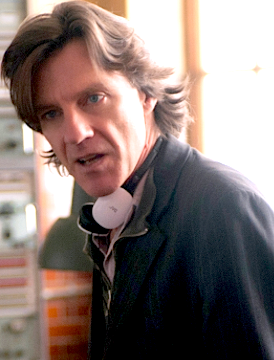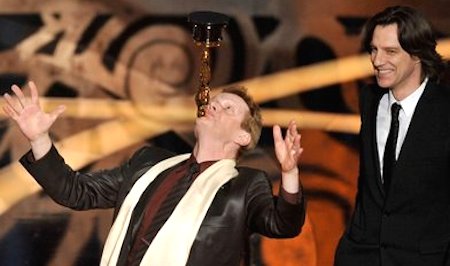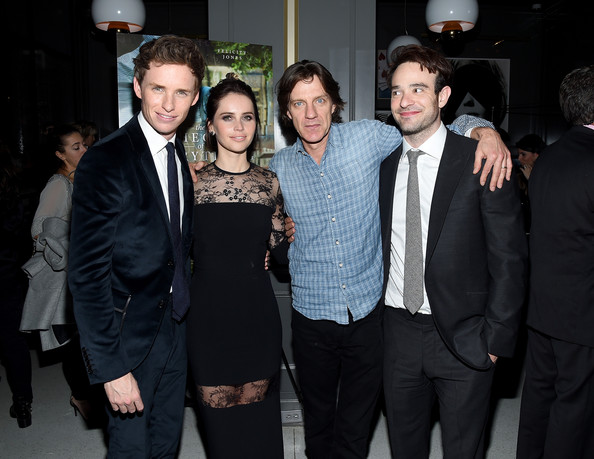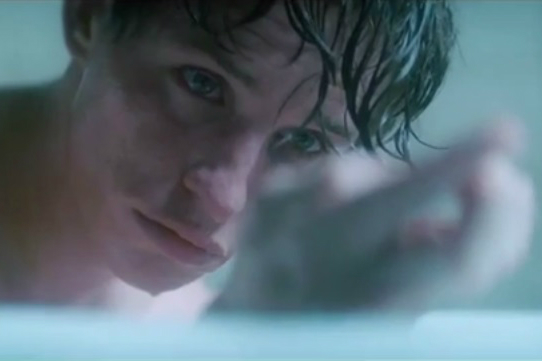Interview: James Marsh on (True) Storytelling from "Man on Wire" to "The Theory of Everything"
 Monday, December 29, 2014 at 12:30PM
Monday, December 29, 2014 at 12:30PM  It's rare for acclaimed documentarians to make a dramatically successful leap into narrative features but with The Theory of Everything, a marital drama about Stephen and Jane Hawking, the 51 year old British filmmaker James Marsh (of Man on Wire and Project Nim fame) is finally doing just that. Man on Wire was one of the most successful documentaries of the past decade but his new affecting biopic, which is actually Marsh's fourth narrative feature, is already his most successful film having racked up an impressive $26 million and counting worldwide to date.
It's rare for acclaimed documentarians to make a dramatically successful leap into narrative features but with The Theory of Everything, a marital drama about Stephen and Jane Hawking, the 51 year old British filmmaker James Marsh (of Man on Wire and Project Nim fame) is finally doing just that. Man on Wire was one of the most successful documentaries of the past decade but his new affecting biopic, which is actually Marsh's fourth narrative feature, is already his most successful film having racked up an impressive $26 million and counting worldwide to date.
It's also been collecting plentiful Oscar buzz. The Film Experience had a chance to chart with this articulate thoughtful Oscar winner so we jumped right in. Here's our conversation:
Nathaniel R: Given your filmography, both documentaries and features, The Theory of Everything is...
JAMES MARSH: Go ahead. You can say it.
Nathaniel R: Ha. Well, it's a much different direction for you. It's romantic drama and it's also old school biography. What prompted your interest?
JAMES MARSH: You’re right in terms of its scale for sure and perhaps its emotional spectrum. But it’s a true story and that’s my background in films I’ve done. It’s a story of a marriage as much as a biopic. That felt like an interesting challenge: to try and examine a relationship that evolves and changes over time given all the impediments and unusual and very difficult circumstances. It felt also that I could go somewhere that a documentary could not go in terms of the intimacy of the relationship.
You're right that it's different but it does have curious connections with Man on Wire. [More...]
You’re dealing with almost the opposite in terms of physicality: one is tightrope walker and one is a man in a wheelchair. Their refusal to accept their boundaries is quite similar and the way they do things that are totally beyond boundaries. So there’s an emotional connection between the films that Anthony McCarten, the screenwriter, was probably thinking of when he sent me the script.
Nathaniel: Did you see connections like these immediately or was this a belated realization?
You come to realize them, for sure. You trust your instincts when you first read something -- 'I could do that and I could live with that for a year and make my discoveries.' But as you finish something you begin to understand what you’ve done finally and how it might connect with other work that you’ve done.
And then when you’re talking with people like me you’re forced to vocalize it!
Indeed. And it’s actually quite difficult for me! I tend to let films go as quickly as i can when i finish something. You can’t change it. You can’t influence what its place in the world is going to be. The healthiest thing is to run away from it and go do something else.

NATHANIEL: Biopics are known for taking liberties but the documentary form is usually viewed as more journalistic, truth-telling if you will. I'm not a Stephen Hawking expert so I don't know if you took liberties but do you think about this divide?
You’re definitely aware of it. In features you’re telling a dramatic story and you’re making choices about what you leave out. And a documentary film is editing and making choices -- the cut and the shape of them isn’t that different. A documentary is a dramatic form as well as a feature.
In a story like Theory it’s — the given facts of the marriage are all there in our film. But of course you take liberities or do everything in broad strokes or are often obliged to. But i don’t have a problem with that either. If you make elisions and composites of characters that feels like what you should do to make the film dramatically coherent.
I know you did some editing early on. Did that prepare you for directing?
Editing absolutely is like going to film school. As an editor you often engage with people’s mistakes and try to cover them up. As a young editor — I was very young -- I found I had some kind of facility for it and I liked making something coherent out of a mess. You’re making the sausage essentially. That’s very useful to understand structure and storytelling and basic grammar of how you get from A to B in a film. That all happens in the cutting room. As an active filmmaker it’s where I’m at my most happy, most comfortable and also most powerful. Perhaps that’s the reason why?
 Man on Wire's Oscar moment with its subject Philippe Petit. James Marsh to your right.
Man on Wire's Oscar moment with its subject Philippe Petit. James Marsh to your right.
NATHANIEL R: Not a lot of famous directors — and I think I can call you that since you’ve won an Oscar...
JAMES MARSH: It’s the first time ever in fact, for that, so thank you for that. What a banner day this is going to be.
[Laughter] What I mean to say is that a lot of well known directors maintain careers in both documentary and dramatic features. Herzog and Scorsese come to mind certainly but it’s not common. Do you plan to continue both?
Absolutely! I’m very lucky to make films in two different kind of forms. 'What’s the best way to tell the story?” With Man on Wire and Project Nim they’re great stories but I thought they had to be told in a documentary format. You had the real archive - you were really there at certain point -- and you had people that were willing to tell you the story. Those two stories were absolutely documentaries. When one of those ideas come along I can’t resist them. But they definitely cross-fertizilie each other those two disciplines of filmmaking.
I find myself very lucky to be able to do both. It’s hard for documentary filmmakers to make that jump, actually. You’re not perceived that way. Even with Man on Wire — it’s not like people were beating down my door to make big movies, quite the opposite. It’s odd that if you make commercials you’re much better qualified to make bigger budget films. I’m not sure why that is — maybe because you’re selling something?
Ah the crass commercial side of showbusiness. Okay, switching gears. Many films of the biopic genre are perceived as actor films as opposed to auteur films.
Well Raging Bull is both.
True. But since these things are largely viewed as "actor's films" is there some piece of this you’re eager to take credit for?
With performances... I don’t extract them from the actors. I ask them to give me the best they can give me and create the circumstances on set by which that can happen. But when you’re given those performances you still have to construct them in the cutting room. They're not just there. That’s where you have more power because you’re constructing the performance from what you’ve been offered. In this kind of movie you have to work with the performances in a quite a detailed and speciifc way to make them coherent across the timeline of the film. This film would only work if Eddie & Felicity had owned their characters and made you believe them to the extraordinary extent that they do.
But you’re job is not done just by being on set and letting them do it. You have to find the emotinal truth of the film itself ... if i’m making any sense at all? Also as a director you’re working with the camera. That’s a huge part of what’s happening for the actors, too. They have to act for the camera and the camera has to have a life independent of the actors but also embrace them. As a director in this kind of genre you have a big responsibility to make the choreography, rhythm and camera dance with the actors as well as you can.
My favorite scene in the film is when Jonathan (Charlie Cox) comes to the Hawking house for dinner the first time and tries to feed Stephen peas.
It’s a great moment. It’s not a scene I’ve talked about a lot and I love that scene. Eating scenes, meal scenes... your heart sinks when you see them in a script because they are difficult. You have all kinds of continuity issues. You force the actors to kind of nibble on things for a whole day. I love the scene because there are so many layers to it. The able bodied man in the house means something immediately. You have a man who can use a knife and fork and Stephen who can not. There's a comment implicit in that and it’s a difficult and painful one.
He makes this attempt when he sees Stephen's struggling with his knife and fork and Eddie, in character, gives him this amazing scowl that speaks volume. It’s a funny moment but it’s also hurtful for Stephen. He’s emasculated a little bit by this offer. It sets up this tension in that scene that is there all the way through it, between the two men. With Felicity/Jane trying to make them be friends and bring them together somehow to make their lives better. That’s the foundation of what becomes a very interesting three way relationship. It’s an essential scene for me and the engine of the second half of the film.
That triangulated relationship was the most interesting part of the movie for me. It's something I genuinely feel I hadn't seen in other films.
Exactly. That’s when I began to think ‘This is interesting. It’s complicated and unusual. There’s enough here. A love triangle with no victim, no predator, and everyone is trying to do the right and decent thing for each party.' I got hooked at that point, too.
 James Marsh with his SAG Nominated Cast
James Marsh with his SAG Nominated Cast
You're a member of the Academy.
I am. I’m a member of the documentary branch.
So how difficult is that process, to look at movies from the other side, and cast your own ballot.
I do it very carefully with a real responsibility to it. If the awards are to mean something they’re given by people who have some qualifications in the industry. We’ve all had some experience of filmmaking, technical or otherwise. I take it quite seriously. I do indeed evaluate. You can separate technical virtuosity in a film that doesn’t necessarily cohere for you as a movie. You can see something in the camera work or score that is really brilliant.
I enjoy doing it but it comes with a duty to do it carefully and thoroughly. I don’t vote if I haven’t seen enough of them in a category, like Animated Feature. But I enjoy the acting acting categories, and Best Picture, Best Foreign Language Film and Best Documentary. It’s both a pleasure and a duty that should be done carefully and properly.
I love hearing that because the awards mean a lot to millions of people.
It’s an honor to be an Academy member. And should be one where you meet your responsibilities and not in a cavalier way.

previous interviews & Oscar predictions
More on The Theory of Everything




Reader Comments (5)
I don't know if you know this about me, but I'm the author of a memoir. So that's very interesting because you are shaping the narrative just as if you were writing fiction. When Marshall talked about the similarities between documentary and biopic, I couldn't help thinking that. THE VERY MOMENT you begin to write, you are including and excluding, structuring, phrasing...without ever fictionalizing or telling a lie, you're stepping away from "the" truth and telling "a" truth.
I imagine this is exactly the same when it is film instead of text.
Deborah -- yeah, i found his answer fascinating and it's totally true. No matter who is telling what story there are omissions that some people would feel are tantamount to lies (depending on their POV) so "truth" in storytelling is...
Interesting to me as I just rewatched this over the weekend. I thought Jones and Cox were brilliant and the triad wouldn't work without Cox having such a firm hold on the ambiguity of the situation. I liked Redmayne but felt he was the weakest of the three (Its a very strong performance, just a hair or two below Jones and Cox---I never got a continuity of character arc from him until Stephen lost his voice). I would also guess that there was a lot more material shot that was left on the cutting room floor (a la a doc). Why would Emily Watson sign on for what is basically a glorified day player even if she got the best laugh? It's not even a good cameo role. The film would have benefited from a narrower time frame. Marsh is a smart director in that he cast well and then got out of his actor's way, but I think Eddie needed a little more coaching to connect the dots. I'ld be curious to know if it was shot in chronological order.
The question of why commercial directors are considered for feature films over docu directors is simple. Commercial directors are working from a script and have 30 to 60 seconds to tell a complete, compelling, hopefully riveting story. For most documentations, the script is being written for you, your job is to capture and condense it. It's not that one is better than the other, but they are very different approaches and commercials are closer to scripted film in structure.
I didn't realize James Marsh was the director of Man on Wire! I must confess, I am considerably more interested in Theory knowing that. Such a great film!
I love that you asked him about his role as an Academy member in the end. It's really interesting to know what insiders think about the whole process we speculate about all year :)